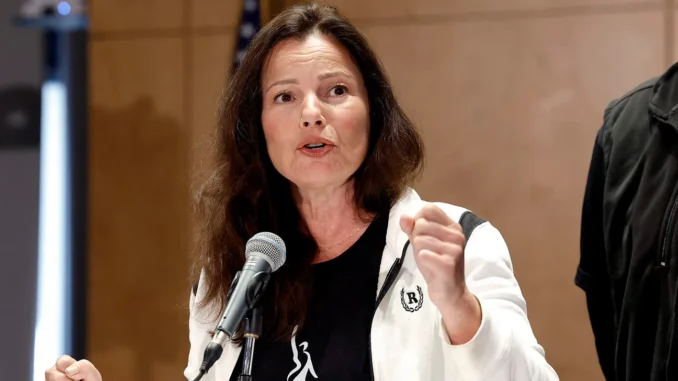
Fran Drescher: “Meryl Streep Said to Me, ‘This Is Great, Now Go Run for President’”
The president of the actors guild discusses the end of the strike and the new deal, a new mechanism for streaming compensation and why she believes the labor group is entering its “golden age.”
With the SAG-AFTRA strike in the rear view, Fran Drescher will soon have more time on her hands to consider career moves outside of union negotiations. But she knows for sure one job she doesn’t want.
“Meryl Streep said to me, ‘This is great, now go run for president,’” the president of Hollywood’s largest union recounts with a laugh over the phone Thursday afternoon, just one day after the union’s negotiating committee — led by Drescher — announced that they had reached a tentative three-year contract deal with Hollywood studios after spending 118 days on strike. “I don’t want that job. Oh boy.”
Instead, Drescher says, she is eager to find “something where I can leverage this for the greater good.” This is referring to the new name recognition and standing that the woman once synonymous with The Nanny has amassed after leading SAG-AFTRA’s 160,000 members through its stand against the changes that streaming platforms have wrought on the industry, and promise-slash-threat of artificiality. intelligence. intelligence. She’s raised many eyebrows over the course of the strike — asking if Hollywood’s top mogul Bob Iger is an “ignoramus” in an interview with Sen. Bernie Sanders, bringing a heart-shaped plushie into negotiations with industry CEOs, appearing at a Dolce & Gabbana event in Italy mid-negotiations — and also won many new fans with her impassioned fight for an industry that is more hospitable to working actors.
In a wide-ranging interview on Thursday, Drescher talked about the provisional deal that finally brought Hollywood’s double-strike era to an end, the fiery, viral speech she improvised at a press conference, her future plans and why SAG-AFTRA may be entering its “golden age.”

What are you most excited to have accomplished in the deal?
The new stream of revenue for members on SVOD is very important and really a big accomplishment. And I think that the AI protections remain something that we are constantly going to have to monitor and fight for the level of protections whereby our members will not be duplicated or synthesized in any way without consent and compensation. So those are very big and absolutely had to happen or it would have been a deal-breaker.
What did you fight hard for in this deal?
I feel like our lowest-paid members who are part of the background community did very well and feel like they’ve been more represented in this contract than ever before. And they actually ended up with the largest minimum increase of any of us, at a whopping 11 percent. That makes me very happy.
What percentage increase did the other performers, who are not background actors, get?
They broke pattern, which also set a new precedent because we ended up getting more than the Writers Guild or the Directors Guild, at 7 percent. And the [benefits] contributions will be more, the caps [on how much an employer can contribute] will be more, we carve a new inroad of revenue on the streaming platforms and we really boxed in as best as we could. We got everything we wanted with the AI protections, which was key. Plus we’re going to be meeting with the AMPTP twice a year to make sure that our finger remains on the pulse of the progress, and also to align ourselves on the same side with regard to federal regulations and protections against piracy.
Is there anything that you didn’t get in this deal that you’d like to fight for next time?
There’s things we’re already thinking about and planning on. Performance capture for the first time was in contract, they’ve been fighting for that for 20 years, and now they’re in contract. But we want to include motion performance and facial performance, and so our intention is next time, we’re going to include those two types of performers in the language specifically. There’s also the people that do audio description: That has never really been regarded by the AMPTP as something that is in the contract made by SAG-AFTRA performers and needs to be recognized as such. So that’s something that we would definitely want to go back [to]. There are aspects of auditions and interviews, where self-tape is the way that the audition and interview happens. And we still want to continue to protect people from a type of casting process that puts a big load on the performers that used to be the casting directors’ responsibilities.
We got some stuff, but we want more. I think that now that we’ve gotten this stream of revenue for the [performers] on the streaming platforms, which never existed before, we will want more, more to spread around to all the members on the platform.